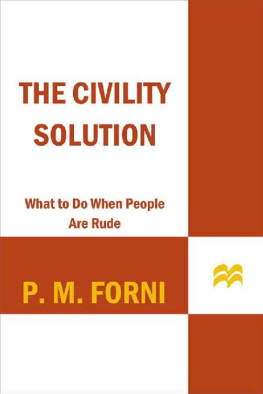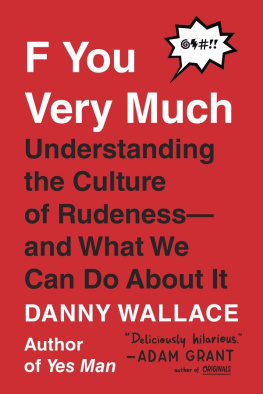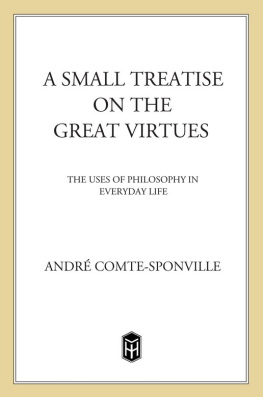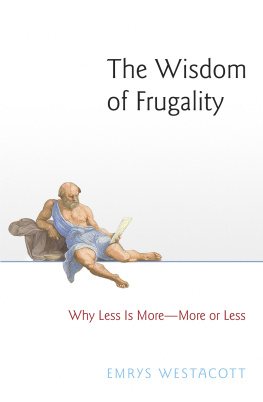Acknowledgments
A pleasant aspect of writing about everyday ethical issues is that many people who are not specialists in moral philosophy take an interest in the topics and enjoy discussing them. Moreover, such discussions are often a source of new insights since everyone has experiences relevant to the issues being discussed and is likely to have reflected on these experiences. For this reason, the list of people who deserve acknowledgment is necessarily quite long. I have decided, though, that it would not be wise to be too specific in identifying particular contributions. Thanking my colleagues, neighbors, family, and friends for stimulating my thinking on rudeness, gossiping, and snobbery could easily be misunderstood! So in most cases I will content myself with simply thanking people who have helped me in one way or another, without trying to specify the exact nature of their contribution. It goes without saying that none of them should be suspected of agreeing with me on all points.
Earlier versions of the essays on rudeness, gossiping, snobbery, and respecting beliefs were presented at the Bergren Forum, an ongoing venue for public presentations at Alfred University. A draft of the essay on rudeness was also presented to the Psychology Roundtable at Alfred University, while drafts of the essay on gossiping were presented at the 49th Northwest Conference on Philosophy at Central Washington University, and to faculty and students at California State University, Sacramento. I am grateful to all who offered feedback at these events. An earlier form of The Ethics of Gossiping appeared in the International Journal of Applied Philosophy 14, no. I (Spring 2000). An earlier version of The Rights and Wrongs of Rudeness appeared in the spring 2006 (vol. 20, no. 1) issue of the same journal. IJAP's editor, Elliot Cohen, offered helpful feedback on both occasions.
Throughout the time I have been writing these essays, Alfred University has provided invaluable institutional backing. This included a sabbatical in the spring of 2004, and the Margaret and Barbara Hagar Professorship in the Humanities from 2007 to 2010. I would particularly like to thank the College of Liberal Arts and Sciences and my colleagues in the Division of Human Studies for their assistance and support.
While writing the book I have twice taught courses at Alfred on the ethics of everyday life. Teaching these courses was tremendously useful. It forced me to clarify my ideas and confront issues I hadn't previously considered. I am very grateful to all the students in those courses for their insights and critical feedback. I also benefited from the lively discussions that occurred when I presented my ideas on some of these topics at seminars for alumni and friends of Alfred University organized by AU's office of university relations.
In addition I would like to thank the following individuals: Michelle Applebaum, Gordon Atlas, Jana Atlas, Eric Baldwin, Cecelia Beach, Robert Bingham, Jim Booker, Sylvia Bryant, Emma Buckthal, Carol Burdick, Brittany Caldwell, Bill Cassidy, Dan Cherneff, Lila Cherneff, Rose Cherneff, Nick Clark, Ann Cobb, Jack Cobb, Priscilla Cobb, Samantha Dannick, Laurent Dappe, Bill Dibrell, Beth Ann Dobie, Joe Dosch, Vicki Eaklor, Debbie Edizel, Gerard Edizel, Nancy Evangelista, Victor Franco, Alena Giesche, Juliana Gray, Larry Greil, Laura Greyson, Allen Grove, Zach Grove, Rie Hachiyanagi, Brian Herbert, Shannon Hickey, Ben Howard, Amy Jacobson, Marie Komanecky, Lou Lichtman, Fenna Mandalong, Chris Mann, Stephanie Martini, Rahul Mehta, Dudley Merchant, Susan Cobb Merchant, Thomas Moran, Susan Morehouse, Geoff Nassimos, Nickelina Noel, Gary Ostrower, Tom Peterson, Becky Prophet, Craig Prophet, Rob Reginio, Simon Reid, Addison Rice, Patrick Saunders, Marilyn Saxton, Robert Shaughnessy, Nathaniel Shipley, Jeff Sluyter-Beltrao, Bob Stein, Molly Sullivan, Jennifer Templeton, Fiona Tolhurst, Hester Velmans, Francie Viggiani, Ben Waissman, Alfonso Watkins, Emmanuel Wedlock, Rayna Winters, and Justin Zeh.
There are certain people to whom I owe gratitude of a different order. Rob Tempio of Princeton University Press was the person who first suggested that I put together a set of essays of this sort, and he has been wonderfully helpful and supportive through the entire project. Chris Stout of Gehrung Associates helped draw attention to my work and thus also deserves thanks for helping to bring this book into being. Lauren Lepow's meticulous editing helped to improve the final text in numerous ways.
I learned much from my many philosophy teachers and would like to recognize in particular David Bell, Frank McDermott, George DiGiovanni, and Robert Kane.
Four close friends of long standing have been especially important to me. They are the supportively critical audience I always imagine looking over my shoulder as I write and to whom I owe a great deal. So I would here like to offer heartfelt thanks to these four: to Mark Alfino and Randy Mayes, who have made so many contributions to my thinking, and who, in countless conversations and responses to written drafts, have generously offered a stream of valuable criticisms, suggestions, and insights; to Chris Horner, who first drew me toward philosophy, and whose undiminished passion for the life of the mind remains an inspiration; and to Mark Waller for star friendship.
Finally, I must thank my family, Vicky, Sophie, and Emily, both for their love and assistance during the writing of the book and for their contributions to it. All the topics covered here have been the subject of lively conversations around the dinner table, and sharp but valuable criticism of my opinions has flowed freely. My deepest debt is to Vicky, for her expertise in sociolinguistics, her countless insights in other areas, her skills as editorial critic and proofreader, her willingness to discuss philosophy around the clock, and her loving support over many years.
1 The Rights and Wrongs of Rudeness
Rudeness is widely perceived to be a common moral failing; moreover, it is generally thought to be on the rise. In a 2002 opinion poll conducted in the United States, nearly 80 percent of respondents said that lack of respect and courtesy should be regarded as a serious national problem, and 61 percent believed that people treated each other with more respect in the past. For this reason alone we should view such opinions skeptically.
It is also possible that a decline in the social importance of formal etiquettewearing exactly the right clothes, using exactly Indeed, when one considers the obvious progress that has taken place over the past century in the struggle to guarantee equal rights, opportunities, and respect for minorities, women, gays and lesbians, people with disabilities, and other groups that have long suffered from prejudice and discrimination, the poll results cited above are really quite surprising.
The idea that standards of civility are in decline thus deserves to be questioned. But so, too, do the underlying normative assumptions that rudeness is always bad and that any increase in rudeness must therefore also be bad. Instead of unthinkingly joining the general jeremiad, therefore, I believe we should first try to understand better both the concept of rudeness and the social situations in which it is employed. In this chapter I will construct a philosophical definition of rudeness and use it to develop a schema that can help us both classify the main forms of rudeness and assess the extent to which rude behavior is or is not excusable. The proposed analysis brings to light some of the presuppositions underlying our common normative judgments about rudeness and indicates how these judgments might be challenged. In particular, it reveals when and why intentional rudeness might be morally acceptable, and it suggests that an increase in rudenesswhether real or merely perceivedmay sometimes be viewed as a sign of cultural health rather than of moral decline.











